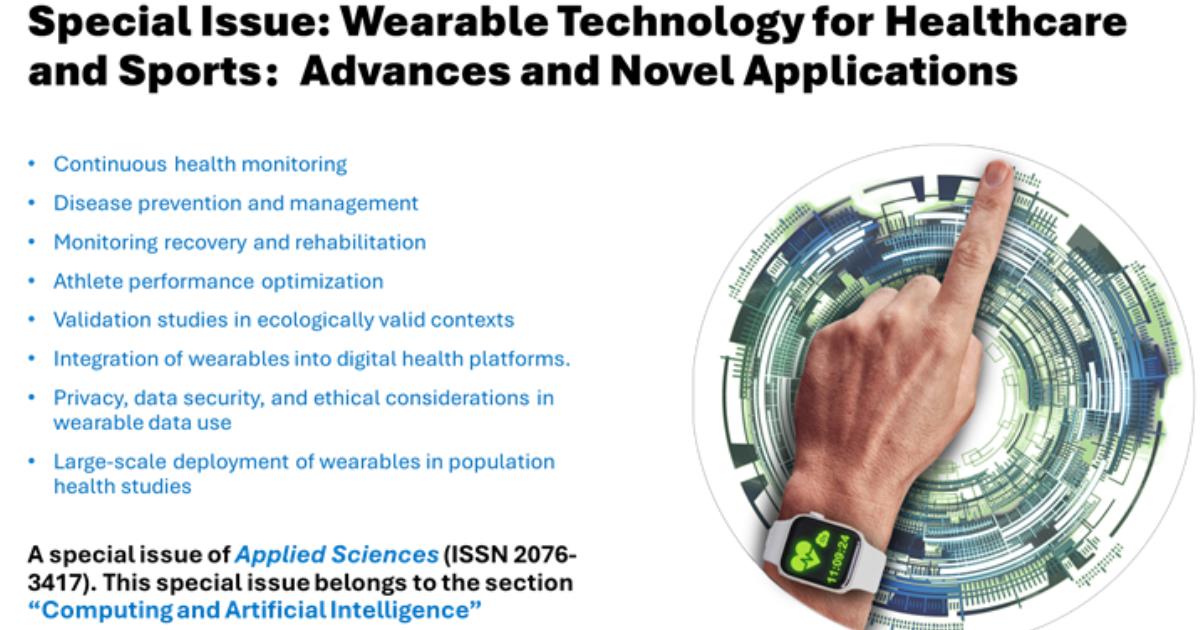- 2.5Impact Factor
- 5.5CiteScore
- 20 daysTime to First Decision
Wearable Technology in Healthcare and Sports: Advances and Novel Applications
This special issue belongs to the section “Computing and Artificial Intelligence“.
Special Issue Information
Dear Colleagues,
Wearable technology has become an integral component of modern healthcare and sports, offering unprecedented opportunities to monitor physical, physiological, and behavioral data in real-world settings. Beyond new hardware, transformative advances are increasingly emerging in how wearable data are processed, analyzed, and translated into actionable knowledge through computing and artificial intelligence. Integrating wearables into digital health ecosystems allows for continuous and remote monitoring, early event detection, and tailored interventions. The ability to capture long-term, real-world and person-specific data provides unique opportunities for predictive modeling, risk stratification, and decision-support tools that can guide practitioners in optimized and personalized treatments.
This Special Issue focuses on novel data-driven applications of wearable technology in healthcare and sports, highlighting the role of advanced data analytics, machine learning, and decision-support systems. Topics of interest include, but are not limited to, the following:
- Continuous health monitoring;
- Disease prevention and management;
- Monitoring recovery and rehabilitation;
- Integration of wearables into digital health platforms;
- Athlete performance optimization;
- Privacy, data security, and ethical considerations in wearable data use;
- Validation studies in ecologically valid contexts;
- Large-scale deployment of wearables in population health studies.
Studies addressing challenges such as data quality, algorithm transparency, interpretability, and user-centered design are particularly encouraged. Manuscripts focused solely on hardware design, component engineering, or prototyping without data-driven evaluation fall outside the scope of this Special Issue. By bringing together contributions from clinical, athletic, and computational domains, this Special Issue aims to foster interdisciplinary insights into how wearable technology can enhance human well-being.
Prof. Dr. Jean-Marie Aerts
Guest Editor
Dr. Jasper Gielen
Guest Editor Assistant
Manuscript Submission Information
Manuscripts should be submitted online at www.mdpi.com by registering and logging in to this website. Once you are registered, click here to go to the submission form. Manuscripts can be submitted until the deadline. All submissions that pass pre-check are peer-reviewed. Accepted papers will be published continuously in the journal (as soon as accepted) and will be listed together on the special issue website. Research articles, review articles as well as short communications are invited. For planned papers, a title and short abstract (about 250 words) can be sent to the Editorial Office for assessment.
Submitted manuscripts should not have been published previously, nor be under consideration for publication elsewhere (except conference proceedings papers). All manuscripts are thoroughly refereed through a single-blind peer-review process. A guide for authors and other relevant information for submission of manuscripts is available on the Instructions for Authors page. Applied Sciences is an international peer-reviewed open access semimonthly journal published by MDPI.
Please visit the Instructions for Authors page before submitting a manuscript. The Article Processing Charge (APC) for publication in this open access journal is 2400 CHF (Swiss Francs). Submitted papers should be well formatted and use good English. Authors may use MDPI's English editing service prior to publication or during author revisions.
Keywords
- wearable sensors
- mHealth
- health monitoring
- data modeling
- digital health
- athlete monitoring

Benefits of Publishing in a Special Issue
- Ease of navigation: Grouping papers by topic helps scholars navigate broad scope journals more efficiently.
- Greater discoverability: Special Issues support the reach and impact of scientific research. Articles in Special Issues are more discoverable and cited more frequently.
- Expansion of research network: Special Issues facilitate connections among authors, fostering scientific collaborations.
- External promotion: Articles in Special Issues are often promoted through the journal's social media, increasing their visibility.
- e-Book format: Special Issues with more than 10 articles can be published as dedicated e-books, ensuring wide and rapid dissemination.

